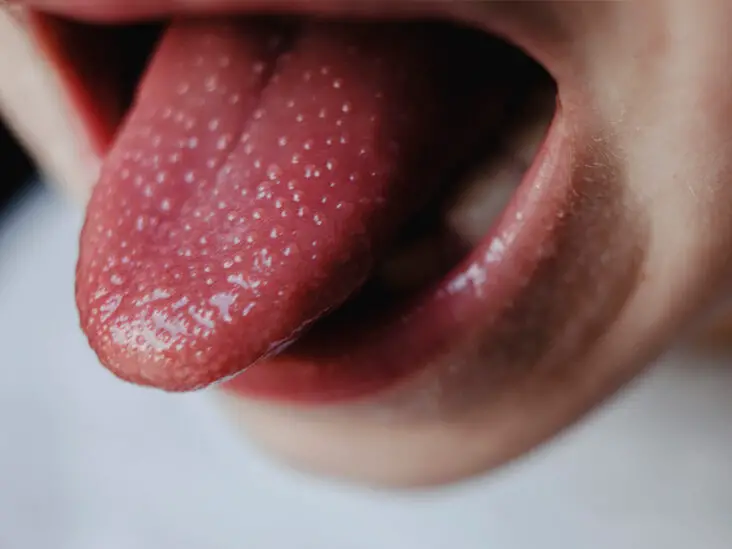Table of Contents
Swollen Taste Buds- Causes, Diagnosis, Treatment, And More!
Have trouble with swollen taste buds again? Or is it your very first time? Whatever the situation is, here’s all you need to know about swollen taste buds and what causes them.
Whether it’s savory, sour, sweet, salty, or bitter, the taste buds let you enjoy and differentiate between 100,000 distinct tastes.
It’s estimated that grown-ups have nearly 2,000 to 10,000 taste buds, each having itty bitty sensory receptors, as per a Texas-based dentist and health educator. When you drink or eat something (or a few somethings if it’s a happy hour), the sensory receptors pass messages to your brain, where the flavor is perceived.
The taste buds may swell up every so frequently, apparently out of nowhere. This is generally because something’s occurred to harm them—say, you had a massive sip of ultra-hot coffee orbit that burned your tongue—and the immune system is functioning hard to restore them.
Swollen Taste Buds

The taste buds are the cause you can imply that lemon is sour and ice cream tastes sweet. These small sensory organs are like the tongue. They allow you to recollect all the distinct tastes —sweet, bitter, sour, salty, and umami (savory or meaty).
You have approximately 10,000 taste buds in whole. They are housed within the tiny bubbles that line the tongue, known as papillae. Every taste bud has nearly 10 to 50 sensory cells linked to nerve fibers. Nerve fibers transmit the note to the brain that you have just licked a lollipop or crunched into an apple.
You have three kinds of papillae:
- Fungiform papillae are the high standard type. You will discover them on the edges and tip of the tongue. These papillae allow you to find the flavor and catch temperature and contact through the sensory cells they possess.
- Circumvallate papillae are discovered at the bottom of the tongue. They are big and round, and they accommodate several thousand taste buds.
- Foliate papillae are pressed on the back edges of the tongue. Each one has several hundred taste buds.
You usually should not be able to feel the taste buds. But occasionally, they may swell up. Inflamed or enlarged taste buds can grow irritated or painful. Bearing swollen taste buds might make drinking and eat highly uncomfortable.
Causes Of Swollen Taste Buds

1. Your oral hygiene requires work
When the flossing and brushing routine is all over the map, viruses and bacteria can get a little overly comfortable within the mouth, directing to the overgrowth of bacteria and infection, as per dentists.
To have the taste buds back on the trail, professionals suggest brushing the top shell of the tongue during daily teeth flossing and cleaning. (This is especially significant if you smoke a lot or have a dry mouth). For a counted layer of security, cap off the routine using mouthwash.
2. Dry Mouth
Dry mouth is not simply a symptom of dehydration or a side effect of specific medications (such as blood pressure meds)—other reasons include the salivary glands not producing sufficient saliva and severe mouth-breathing (like when you are struggling with a stuffy nose).
Taste buds need a moist habitat to work correctly, and thus a dry mouth can drive them to grow irritated and swollen.
Consuming enough water is essential in these circumstances, but if medicine or lagging salivary glands are the offenders, synthetic saliva mouth sprays are present to help you. As for the stuffy nose, you can enhance nasal ventilation with stem inhalations and mentholated candies with counted eucalyptus oil.
3. Your Stomach Acid Starts To Travel
Acid reflux is induced by stomach acid proceeding backward and up within the esophagus. Occasionally, this acid can create its way to the mouth, driving burning sensations on your tongue and giving rise to swollen taste buds.
Sidestepping foods that can worsen reflux is the primary step to minister this (such as avoiding: spicy and fatty foods, chocolate, coffee, and soda). Anti-reflux medicines are known too, such as lansoprazole and omeprazole, should dietary modifications not make much of a contrast.
4. An infection may be brewing
Although occasional, swollen taste buds from a bacterial or viral infection may happen. Scarlet fever is an illness that can occur in people suffering from strep throat, and it is the most prominent culprit. Along with fever, swollen tonsils, and rash, your tongue gets coated and begins to peel. It evolves bright red, and swollen taste buds are seen, giving your tongue an impression much like that of a strawberry.
Viral diseases, like the flu and cold, generally go away independently. If the symptoms stay any more than ten days, have the doctor conduct a rapid strep test to determine if the infection is bacterial and needs antibiotics.
5. Something hot (or icy) generated irritation
Temperature extremes can harm the taste buds and cause swollen taste buds—fortunately, they will generally heal within some days of treatment. It is best to evade alcohol mouthwashes while your taste buds are still recovering, as this may make them more upset and inflamed. Experts also recommend drinking enough water to deter bacteria from obtaining more ideas and worsening the infection.
6. Spicy or acidic foods are forever on the plate
Apart from making acid reflux much more threatening, the chemical outrage from spicy and acidic meals might give rise to inflamed, swollen taste buds. The annoyance will settle pretty fast, so long as the spicy food is far apart from your menu. Consuming milk can help relieve the area in the meantime.
7. You could have transient lingual papillitis (TLP)
A common (and harmless) state, TLP gives rise to inflamed, swollen taste buds that seem like small white or red bumps on the front of your tongue. The precise cause is not understood, but it might be connected to hormones, stress, or certain foods. TLP typically clears up on its own in just a few days.
8. Though unlikely, it might be oral cancer
Although extremely rare, oral cancer can occasionally appear with swollen taste buds. It occurs from squamous cells that show up as a big bump that oozes effortlessly—ordinarily present on the side of your tongue—and is more typical in heavy drinkers and smokers. If you see a non-healing lump or ulcer on the tongue and it does not settle within two weeks, talk to your doctor for a quick checkup and further treatments.
9. Smoking

Cigarettes comprise chemicals that upset the taste buds. Smoking can likewise numb your taste buds, decreasing your capacity to differentiate between flavors.
10. Vitamin Deficiency
A deficiency of iron, vitamin B, or additional nutrients might cause the tongue to protrude or swell up.
Can it be an emergency?
Swollen papillae usually do not cause an emergency. Oral cancer is one potential cause, but it’s not typical. If you are not sure of the reason, or the swollen taste buds don’t go away, visit your doctor.
Other symptoms of oral cancer are:
- a sore in the mouth
- pain in the mouth
- weight loss
- a red or white patch on the tongue, tonsils, gums, or the interior of the mouth
- numbness of the tongue
- loose teeth
- a lump in the cheek
- difficulty chewing, swallowing, or moving the jaw or tongue
- sore throat that does not go away
- lump within the neck
Other signs that could mean a more severe issue include:
- high fever
- pain that does not go away
- cough that does not go away
The complications are based on underlying illness leading to your swollen taste buds. Many of the problems that lead to swollen taste buds will grow better on their own with no additional problems. While you have swollen taste buds, eating becomes painful and difficult.
How will you be diagnosed?
The doctor can interpret the reason behind swollen taste buds simply by analyzing your tongue. The doctor or dentist will examine your tongue’s color, size, and texture. While putting on gloves, they may touch the tongue to notice any bulges or lumps or review whether you have any discomfort.
If the doctor doubts oral cancer, you may require a biopsy. This test withdraws a small sampling of tissue from the tongue. The sample is shipped to a lab and studied under a microscope to determine the type and stage of cancer.
How can you get rid of swollen taste buds?

TLP typically goes away on its own in just a few days. Other potential causes are ministered based on the underlying condition-
- Acid reflux: Take H2-receptor blockers, antacids, or proton pump inhibitors to decrease or stop stomach acid.
- Allergies: Do not consume the foods that activate your symptoms.
- Infections: Use antibiotics if bacteria force the infection.
- Vitamin deficiencies: Take mineral or mineral or vitamin supplements to bring the levels back to standard.
Speak with your doctor to develop a good medicine or treatment plan that functions for you and cures the issue. You should not take any additional supplements without speaking with the doctor first.
Here are some other things you can keep in mind to keep your papillae with the rest of your mouth in a healthy and hygienic condition:
- Practice good oral hygiene- Brush two times a day, floss every day and use a mouth rinse. These methods will stop bacteria from gathering on the tongue and teeth.
- Quit smoking: Smoking degrades your teeth, deadens your feeling of taste, grows your risk for many diseases like gum disease, and makes you highly likely to acquire oral cancer. Smoking cessation by-products, medicine, and treatment can all assist you in kicking the habit.
- Do not eat spicy and acidic foods: Foods such as citrus fruits or hot peppers can scrape the tongue even more.
- Gargle using a mixture of warm water and salt thrice a day: This will assist in keeping the mouth clean.
The Bottom Line
Swollen taste buds may indicate someone is not able to taste bad foods. A sense of taste, when compromised, can also influence a person’s hunger and delight in their food.
These issues with food intake can result in undesirable weight loss if not dealt with soon. Ideally, an individual can strive for medical treatment to recognize underlying reasons for swollen taste buds so their taste senses return.


